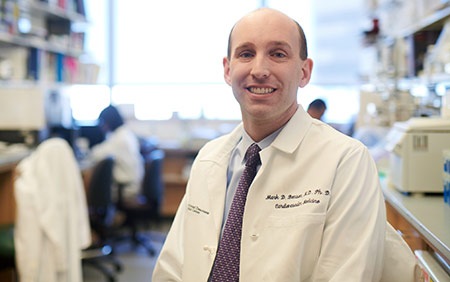High Cholesterol (Hyperlipidemia)
Having hyperlipidemia means there are too many lipids (fats) in your blood. Cholesterol and triglycerides are the two main types of fats in your blood; the more there is of each, the higher the risks to your heart and vascular health.
High Cholesterol Overview and Diagnosis
Many people do not know they have high cholesterol, as it often has no obvious symptoms. The American Heart Association recommends that you have a blood test to check cholesterol every four to six years after age 20. Talk with your doctor about having your cholesterol checked as well as your risk for heart disease and stroke.
Types of Cholesterol
There are two types of cholesterol: HDL (good) cholesterol, and LDL (bad) cholesterol. Triglycerides, which store extra energy from your diet, are the most common fat found in the body.
HDL
- Helps remove bad cholesterol from your blood
- Having a high level of HDL may help protect you from developing heart disease
LDL
- Causes fatty buildups (plaque) in the arteries, which make your arteries more narrow
- Having a high level of LDL (or not enough HDL), coupled with a high level of triglycerides in your blood, increases your risk of heart attack, stroke and peripheral artery disease
A simple blood test can determine the levels of HDL, LDL and triglycerides in your blood.
Causes & Risk Factors of High Cholesterol
Your body needs cholesterol to build cells, and your liver makes enough cholesterol to do that. You can also get cholesterol through animal food sources, though these are usually high in saturated and trans fats, which force your liver to make even more cholesterol than it would on its own. In many cases, this can cause you to develop an unhealthy cholesterol level.
Usually, high cholesterol is a result of unhealthy behaviors:
- Smoking or frequent exposure to secondhand smoke
- Being overweight or obese
- Eating an unhealthy diet
- Not getting enough exercise
Sometimes people inherit high cholesterol from parents or grandparents, called familial hypercholesterolemia (FH). FH can lead to atherosclerotic heart disease at a young age. Knowing that you have a family history of high cholesterol can help with treatment.
High Cholesterol Treatment at BIDMC
High cholesterol can usually be successfully improved and managed through healthy diet and lifestyle changes. Your doctor can also prescribe medication to help lower your cholesterol if needed. If you have high cholesterol, talk to your doctor about maintaining a healthy lifestyle to help reduce your risk of heart disease.
- Eat a heart-healthy diet
- Exercise regularly
- Maintain a healthy weight
- Quit smoking
- Take medications as prescribed
Dietary changes to help lower cholesterol include reducing your intake of saturated and trans fat:
- Limit red meat and whole-milk dairy
- Eat low-fat or fat-free dairy products
- Limit fried food
- Use oils high in “good” polyunsaturated and monounsaturated fats, like olive oil and vegetable oils
- Include foods high in “good” polyunsaturated and monounsaturated fats, such as nuts, fatty fish like salmon and trout, and avocado
- Eliminate (or severely limit) foods with trans fat (partially hydrogenated oils), including stick margarine, fast food and commercially-produced baked goods and doughs
Lipid & Cardiovascular Disease Prevention
The CVI’s Lipid and Cardiovascular Disease Prevention Clinic helps patients with high cholesterol assess and reduce their risk of cardiovascular disease.


